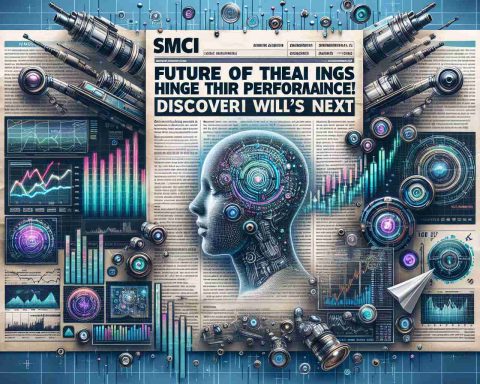Stanley Druckenmiller, a prominent billionaire hedge fund manager, finds himself reflecting on a pivotal decision. In a candid moment during a Bloomberg interview last year, he expressed his deep regret about selling his fund’s stake in Nvidia Corporation, a leader in the burgeoning artificial intelligence industry.
What prompted this remorse? The value of Nvidia’s stock skyrocketed, tripling in less than a year, leading Druckenmiller to reassess his decision as a substantial error in judgment. Nvidia has been achieving remarkable revenue and profit growth due to their cutting-edge graphics processing units (GPUs), establishing a stronghold in the AI sector.
However, Druckenmiller is not alone; other notable investors, such as Ken Griffin of Citadel and David Shaw of D.E. Shaw, have also decided to scale back their Nvidia investments. Meanwhile, David Tepper of Appaloosa Management significantly reduced his stake, citing concerns regarding the company’s long-term prospects.
Despite its dominance in the GPU market, Nvidia faces increasing competition. Major clients like Microsoft, Alphabet, Amazon, Tesla, and Meta Platforms are investing in their chip development, which may slow Nvidia’s growth trajectory.
Ultimately, Druckenmiller’s regret highlights both the immense potential of Nvidia and the inherent uncertainties in the tech investment landscape. As the company navigates fierce competition and fluctuating valuations, its future remains a topic of intense speculation among investors.
Beyond the Boardroom: Implications of Nvidia’s Dominance
The rise of Nvidia is more than just a corporate success story; it serves as a microcosm of broader trends shaping society and the global economy today. As the world’s reliance on artificial intelligence infrastructures increases, the economic impact of tech giants like Nvidia becomes profound. Their innovations not only fuel advancements in sectors ranging from healthcare to finance, but also bolster national economies as countries strive to achieve tech sovereignty.
The cultural implications of artificial intelligence, driven by Nvidia’s products, are equally significant. As AI technologies become integral to everyday life, they influence workforce dynamics and consumer behavior. Jobs once deemed secure are now under threat of automation, prompting debates surrounding education, reskilling, and ethical AI deployment. This cultural shift emphasizes society’s need to adapt swiftly to stay relevant in a rapidly evolving digital landscape.
Environmentally, the production of GPUs and AI technologies poses challenges. The energy consumption associated with large-scale AI computations is substantial, with data centers consuming nearly 1% of global electricity. As the demand for AI grows, so too do concerns about the ecological footprint of these technologies.
Looking to the future, the competition Nvidia faces may stimulate innovative breakthroughs that can redefine market dynamics. Investors and consumers alike are left to ponder: will the growth narrative continue to favor established players, or will new challengers disrupt the status quo? Both scenarios hold significant relevance for investors, industries, and societies as we navigate this technological frontier.
Why Nvidia’s Soaring Stock Sparks Regret Among Top Investors
## Understanding Nvidia’s Market Position and Challenges
Nvidia Corporation has emerged as a powerhouse in the tech industry, particularly in the realm of artificial intelligence (AI) and graphics processing units (GPUs). Stanley Druckenmiller, a high-profile hedge fund manager, openly shared his regret over selling his stake in Nvidia during a Bloomberg interview, underscoring the volatility and risks involved in tech investments.
Market Performance and Growth
Nvidia recently witnessed unprecedented growth, with its stock price tripling in less than a year. This tremendous surge can be attributed to the company’s dominant position in the AI market and its continual innovation in GPU technology. In the fiscal year 2023, Nvidia reported a staggering increase in revenue, driven primarily by the demand for AI-driven applications and high-performance computing.
Pros and Cons of Investing in Nvidia
Pros:
– Leader in AI Technology: Nvidia is at the forefront of AI and deep learning, making its GPUs essential for various tech applications.
– Strong Financial Performance: The company has posted record revenue and profit margins, indicating robust demand for its products.
Cons:
– Intensifying Competition: With major companies like Microsoft, Google, Amazon, and Tesla developing their chips, Nvidia could face significant market share erosion.
– Market Volatility: The tech sector is known for its unpredictability, leading to fluctuating valuations that can affect investment returns.
Key Competitors and Market Landscape
Nvidia is not the only player in the GPU market; several tech giants have begun to invest heavily in developing their GPU technologies, which could disrupt Nvidia’s stronghold. For instance:
– Microsoft: Investing in custom AI chips for its Azure cloud service.
– Alphabet: Working on advanced AI processing capabilities.
– Amazon: Enhancing their cloud offerings with proprietary chips.
– Tesla: Developing hardware for autonomous driving.
– Meta Platforms: Focusing on AI applications for social media and metaverse technologies.
These advancements could pose challenges for Nvidia, potentially leading to slower growth rates as rivals catch up.
Predictions and Future Trends
Analysts predict that while Nvidia will likely maintain its market leadership in the short term, the long-term outlook remains uncertain. Factors to watch include:
– Emerging Technologies: Nvidia’s ability to innovate and adapt to new AI trends will be critical.
– Regulatory Changes: The tech industry is under scrutiny, and potential regulations could influence Nvidia’s operations.
– Global Economic Conditions: Economic downturns or supply chain disruptions may also affect growth projections.
Investing Insights
For potential investors, understanding both the growth potential and risks associated with Nvidia is crucial. An investment in Nvidia could yield significant returns, especially as AI technology continues to expand, but it’s essential to remain cautious about the competitive landscape and market dynamics.
Conclusion
Stanley Druckenmiller’s reflective moment on his Nvidia investment serves as a reminder of the complex nature of tech investing. While Nvidia has proven its prowess within the AI sector, the entrance of formidable competitors and evolving market conditions highlight the risks and opportunities that investors must navigate. As the tech landscape continues to evolve, staying informed about market trends and company performance will be vital for making sound investment decisions.
For more details on Nvidia’s market updates and technology trends, visit nvidia.com.




















